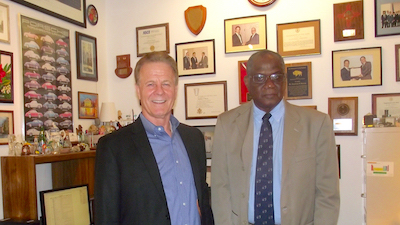In August 2017 the EEMI became an official partner of the Organization of American States to address renewable energy needs in the Caribbean region. The purpose of the new partnership is to design and deliver educational tools that advance the development and diffusion of sustainable energy options that promote a more diversified and resilient infrastructure in the Caribbean.
The initiative, known as the “Caribbean Sustainable Development Education & Training Initiative" is to pursue the development of specialized and practical educational tools with and for educational institutions within the Caribbean. Working with the Executive Secretariat for Integral Development of the Organization of American States, the EEMI will explore distance learning and on-line learning opportunities for Caribbean educators in order to broaden and further their teaching expertise, as well as developing on-going technical assistance for them to address information and skills gaps, and to develop other requisite and applicable tools and materials.
According to the World Bank, the Caribbean region’s population and assets are among the most exposed to natural disasters in the world. It is estimated that the region as a whole lost approximately $9 billion between 2007 and 2011 to natural disasters. Moreover, events linked to climate change, such as more intense hurricanes, sea level rise, salt water intrusion, floods, drought, and damage to coral reefs and coastal habitats, present a daunting array of challenges for state and non-state actors alike.
To address these challenges, new skills will be needed – ones that facilitate integrated and sustainable development planning, land use planning, resource assessment, business formation, technology management, integrated water resources management, renewable energy growth and energy efficiency, hazard risk management, and improved resiliency, among others. Key to the acquisition of these skills will be the design and delivery of educational programs.
The EEMI and OAS will invite the participation of select national and regional educational institutions such as the University of the West Indies (UWI), and the University of Technology and the Tropical Agricultural Research and Higher Education Center (CATIE), among others, to design and deliver multidisciplinary curricula geared to producing the skills to successfully integrate the regulatory, analytical, planning, design and installation approaches required for a sustainable and resilient energy infrastructure. The deliverables, guided by SEDI with input from UWI and others will include:
- Specialized and practical tools for Caribbean educational institutions,
- A review of Caribbean countries that have successfully implemented integrated sustainable and resilient energy and water applications,
- Consolidated databases and catalogues of existing in-region small and medium-sized companies that currently are deploying and servicing sustainable and resilient energy technologies and solutions, and
- An exploration, with SEDI and UWI, of distance-learning and on-line learning opportunities to address information and skills gaps, and to develop other requisite and applicable tools and materials.
A copy of the agreement between the EEMI and the OAS, signed by Dean Dolling, can be seen at:
An overview description of the initiative can be seen at:


